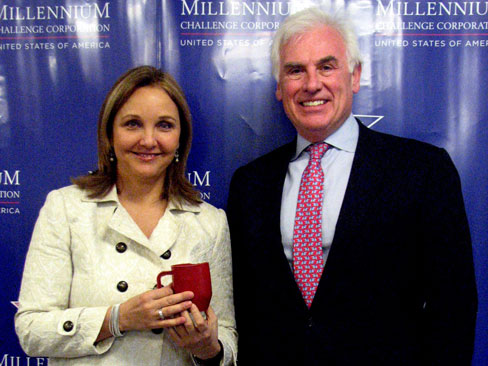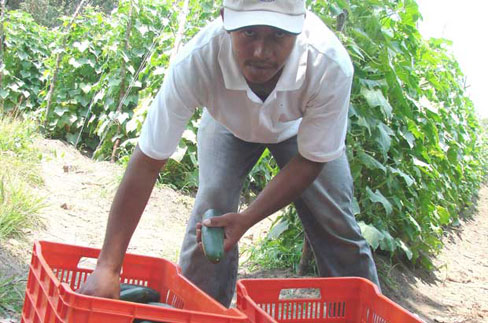Forging Partnerships for Food Security and Poverty Reduction
The holiday season is a particularly poignant time to reflect on the needs of those around the world who are less fortunate than ourselves. We are responsive to the struggle and sacrifice confronting millions of families worldwide who are living in poverty. Their incredible burdens are also the most basic of human needs-how to access shelter, food, health services, education, and jobs. MCC is making a difference in this fight against systemic, entrenched poverty. And, we are enhancing our efforts by partnering with organizations that share our core belief that generating sustainable prosperity, development, and growth can improve the lives of the poor.
MCC’s MOU with the World Food Program

MCC CEO Ambassador John Danilovich and World Food Program Executive Director Josette Sheeran, pictured here with a small red cup Sheeran brought from Africa is an actual portion size of the only food that some children in school food programs throughout the world receive on a daily basis.
Today, I joined Josette Sheeran, my good friend and a champion for the poor who serves as the World Food Program’s (WFP) Executive Director, to sign a memorandum of understanding (MoU) between the WFP and MCC that creates a framework for coordinating our investments to significantly leverage our mutual impact on global economic growth, poverty reduction, and improved food security. The MoU outlines three areas of cooperation in countries where both the WFP and MCC work: agricultural production, policy and program reforms, and gender integration. These are all important components for strengthening local markets and achieving food security.
Building on MCC’s existing partnership with the Alliance for a Green Revolution in Africa (AGRA), MCC and the WFP will initially work in countries where MCC is already collaborating with AGRA. The cooperation between MCC and AGRA is bearing fruit and setting a precedent for results. In Madagascar, for example, AGRA is considering an investment of over $500,000 to MCC-funded agricultural business centers to set up farmer-based seed multiplication sites for improved varieties of rice, corn, and beans.
MoUs like these-with AGRA and now with the WFP-demonstrate MCC’s commitment to augmenting U.S. taxpayer money with additional initiatives. This approach prevents duplication of efforts, enhances the impact of each project activity, and helps our partners attract investments in long-term growth. Particularly in a time of severe financial constraints, this is a smart and strategic approach that ensures that every dollar counts.
MCC’s Partnerships throughout Latin America
What’s equally smart and strategic is the power of effective partnerships to fight poverty in the Americas. With nearly $1 billion committed to compacts and threshold programs in the Americas, MCC is proof of positive and constructive U.S. engagement throughout the Western Hemisphere.

MCC CEO Ambassador John Danilovich shakes hands with Bharrat Jagdeo, the President of Guyana
I was reminded of this just yesterday when I welcomed Bharrat Jagdeo, the President of Guyana, to MCC to discuss progress on Guyana’s nearly $7 million MCC threshold program, which is aimed at overhauling fiscal policies, creating a more business-friendly environment, and streamlining business registration. Guyana’s progress is proof of the deep resolve in the Americas to replace poverty with prosperity, and we are proud of our role in helping our partners achieve their self-determined, country-driven antipoverty plans.

Farmers in Honduras received technical assistance and training in small business skills and agricultural practices
Last night, I attended an event hosted by the Council of the Americas where I spoke about the “good news” of MCC’s approach to development assistance and what it is accomplishing in the hemisphere-students attending vocational training, thousands of families receiving land titles, farmers benefitting from training to increase their agricultural productivity, jobs being created, and key infrastructure being developed. The slideshow of MCC’s work in Latin America provides an overview of the strength of our partnerships to transcend the often empty rhetoric of politics to deliver the tangible reality of positive, meaningful change for the poor.
MCC’s partnerships-whether with other donors or with partner countries-is how the fight against poverty will be won. Through mutual accountability and a mutual investment of resources, expertise, and resolve, we see this underway already. The time to further build on this progress is now.


